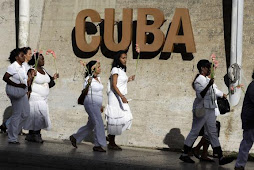Restoring US and Cuba ties not a done deal as Congress may still be a threat
As countries move to reopen embassies, analysts warn Republicans pose
potential hurdle in agreement to end more than 50 years of hostility
@richlusc
Saturday 13 June 2015 21.09 BST Last modified on Saturday 13 June 2015
21.48 BST
President Obama's goal of restoring diplomatic ties with Cuba by
reopening the US embassy next month and sending secretary of state John
Kerry to Havana for a highly symbolic flag-raising ceremony could yet be
thwarted in Congress, experts believe.
The Obama administration plans to announce early in July details of the
deal with Raúl Castro's communist government that would formally end
more than half a century of hostility between the countries, according
to a report published on Friday.
But analysts of US-Cuba politics say the approval of Congress could
still be a major obstacle to the agreement, and doubt whether the
Republican controlled Senate and House of Representatives would approve
the funding that would be necessary.
"Congress has to get on board," said professor Bruce Bagley, an expert
in Cuban affairs at the University of Miami's department of
international studies.
"I doubt sincerely we will see any big budgetary moves before President
Obama leaves office, certainly not enough to open an entire embassy.
It's not clear it can happen unless Congress approves the money."
Additionally, only Congress has the authority to lift the decades-old US
trade embargo with Cuba, and must be notified by the state department at
least 15 days in advance of any plan to upgrade the status of the US
interests section building in Havana to that of a full-fledged embassy.
Formal negotiations between administration officials and Havana have
been ongoing since December, when Obama announced groundbreaking and
sweeping changes to US policy following 18 months of secret talks and a
controversial prisoner exchange. In April, Obama and Castro met
face-to-face for the first time at an economic summit in Panama, a
significant moment in the new era of diplomacy.
Kerry's visit, which is still scheduled for 2 July despite him breaking
his leg in a bicycle accident in Geneva last month, and the plan for
both countries to reopen their embassies, are "proof of progress in the
conversation" Bagley said, especially following the US move last month
to drop Cuba from the list of countries that sponsored terrorism.
"This continued advancement and Kerry's trip have symbolic value to the
US in that they maintain the momentum, and other countries see that the
US wants to reestablish relations," Bagley said.
But he acknowledged that deep divisions remain over Cuba's human rights
record and the trade embargo, and that some politicians with strong
opinions on Cuba were deeply opposed to Obama's desire to thaw relations.
"There is ferocious opposition from Marco Rubio and others," he said.
"Change will be slow whatever happens."
Rubio, a Florida senator with Cuban parents who is seeking the
Republican nomination for the 2016 presidential election, is one of the
most vocal opponents in congress of the Obama policy. He declared the
decision to take Cuba off the terror blacklist as "terrible" and "a
chilling message to enemies that the White House is no longer serious
about calling terrorism by its proper name."
Rubio has also been a leading proponent of legislation that would
prevent taxpayer dollars supporting the more relaxed US policy towards
Cuba, or directly benefiting the Cuban economy.
"It is not in the interest of the United States or the people of Cuba
for the US to become a financier of the Castro regime's brutality," he
said last week as he announced a bill that would specifically outlaw
transactions between American companies and the Cuban military and
security forces.
Andy Gomez, a Miami-based veteran expert in Cuban studies, said such
opposition in Congress could upset Obama's timetable for progress and
even hamper the president's desired legacy over Cuba, particularly the
end of the trade embargo, before he leaves the White House in January 2017.
"I think we're still very far away from reconciliation," Gomez said.
"There are a series of these bills to lessen trade or guarantee no
taxpayer money will be used to pay for it."
Gomez said he also suspected Obama might wait until Washington
politicians were on summer recess before announcing a new US ambassador
to Havana as an administrative appointment, knowing he would not have
senate support for a confirmation.
"I still have many questions. I want to know what's in Cuba that's so
interesting to the US. Tourism? Godfather 4?" he said.
According to White House sources quoted anonymously in Friday's report,
negotiators have been able to overcome differences in the freedom that
US embassy staff would have to travel around Cuba. Only a few minor
differences remain, the source said.
Gomez also believes Cuba has been working behind the scenes in its
discussions with Washington to try to present a more favourable image.
"Politically I've seen nothing, but Cuba is moving to show the world
that it is restructuring economically," he said."It's been said that the
US has put everything on the table and Cuba has brought nothing, but
Cuba has made some interesting moves."
Source: Restoring US and Cuba ties not a done deal as Congress may still
be a threat | US news | The Guardian -
http://www.theguardian.com/us-news/2015/jun/13/us-cuba-diplomacy-republican-congress-obstacle
Subscribe to:
Post Comments (Atom)





No comments:
Post a Comment